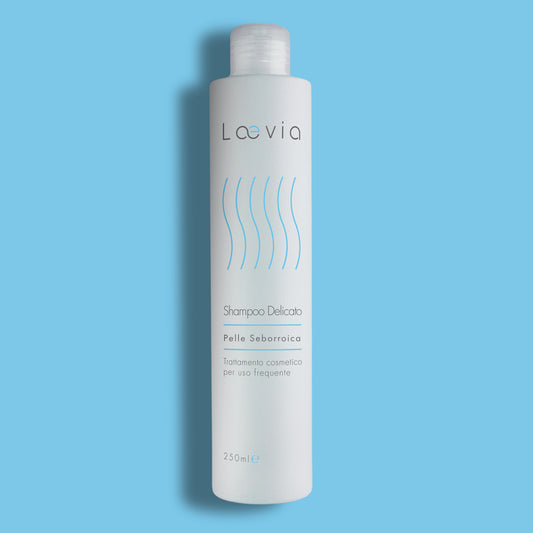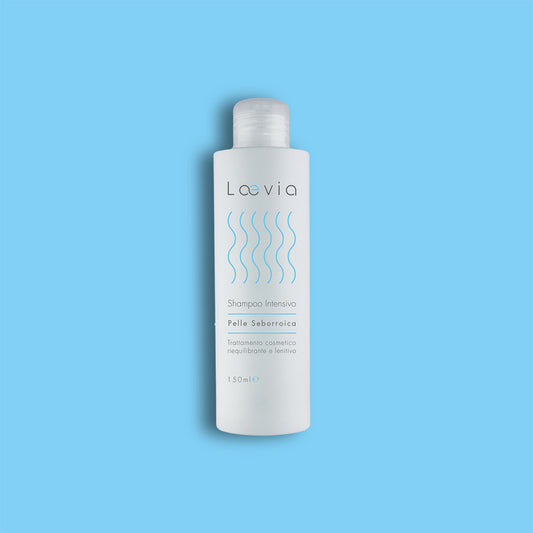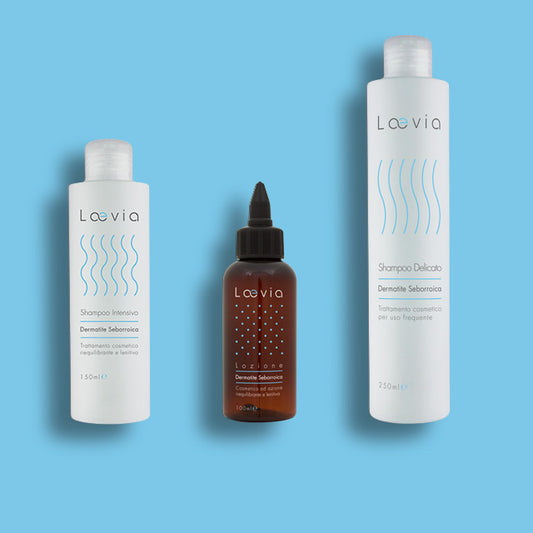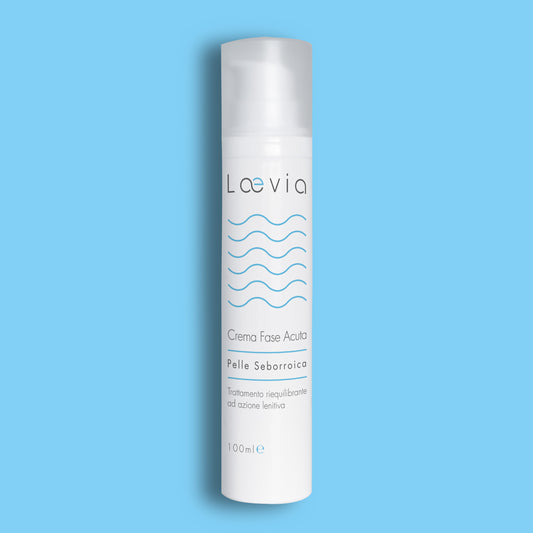The hydrolipidic mantle, which forms the barrier against the growth of harmful bacteria, can be destroyed by aggressive detergents and therefore must be treated delicately.
Cleansing the skin and scalp, especially if they are affected by seborrheic dermatitis, requires particular delicacy, which can be achieved thanks to the use of specific products that respect the skin's natural defenses. In fact, against external agents, the skin is covered with a layer of fat and water, called the 'hydrolipidic mantle', which must remain intact to carry out its protective action. For this reason, it is essential to choose the right detergent that takes care of the problem, carrying out a soothing action on itching and controlling the overproduction of sebum without destroying the hydrolipidic layer, with a preventive effect against relapses or exacerbations of the symptoms of seborrheic dermatitis. . On the contrary, the use of very aggressive detergents can further irritate the skin already affected by seborrheic dermatitis (remember that it is a chronic disease), favoring the excessive production of sebum which aggravates the formation of crusts and flaking typical of the pathology.
Cleaning and scheduled washing in the treatment of seborrheic dermatitis
The skin and scalp affected by seborrheic dermatitis, even if they have a greasy and greasy appearance, should not be washed often. You can limit yourself to two daily face washes, one in the morning and one in the evening, using not too hard water (which does not have a high content of mineral salts), and massaging the skin with detergents that respect the hydrolipidic mantle, with a Weakly acidic pH (around 5.5) and preferably containing silk proteins, collagen or vegetable glycerin. More specific products can be added to these detergents, with an emollient and hydrating action, for delicate cleansing and targeted action on the symptoms of seborrheic dermatitis. Hair should also be washed no more than two/three times a week, avoiding subjecting it to treatments that could increase stress on the scalp and the health of the hair.
Cleaning and scheduled washing in the treatment of seborrheic dermatitis
The skin and scalp affected by seborrheic dermatitis, even if they have a greasy and greasy appearance, should not be washed often. You can limit yourself to two daily face washes, one in the morning and one in the evening, using not too hard water (which does not have a high content of mineral salts), and massaging the skin with detergents that respect the hydrolipidic mantle, with a Weakly acidic pH (around 5.5) and preferably containing silk proteins, collagen or vegetable glycerin. More specific products can be added to these detergents, with an emollient and hydrating action, for delicate cleansing and targeted action on the symptoms of seborrheic dermatitis. Hair should also be washed no more than two/three times a week, avoiding subjecting it to treatments that could increase stress on the scalp and the health of the hair.

Delicate cleansing products.
The golden rule to help the skin and hair counteract the symptoms of seborrheic dermatitis is only one: choose delicate products. In fact, there are formulations free of parabens, sodium lauryl sulphate/sodium lauryl ether sulphate (SLS/SLES), petroleum derivatives (PEG, PPG), dyes, alcohol, formaldehyde derivatives or silicone oils, and artificial preservatives. It is better if the same formulations have been tested to also exclude the presence of nickel, the most frequent cause of skin allergies. The use of delicate products is not entirely feminine advice, but is also aimed at the daily care of men during shaving, where it is best to avoid adding irritation from aggressive products to the stress induced by the use of the blade, however preferable to the electric razor which risks heating the skin too much during use.
Optionally, for the skin of the face and scalp.
Depending on the area to be cleansed, products can be used that contain components mainly of vegetal origin with a combined action capable of hydrating, elasticising and deeply nourishing the skin. For the skin, formulations with the following ingredients should be preferred:
Hair also prefers vegetable and products that contain:
The golden rule to help the skin and hair counteract the symptoms of seborrheic dermatitis is only one: choose delicate products. In fact, there are formulations free of parabens, sodium lauryl sulphate/sodium lauryl ether sulphate (SLS/SLES), petroleum derivatives (PEG, PPG), dyes, alcohol, formaldehyde derivatives or silicone oils, and artificial preservatives. It is better if the same formulations have been tested to also exclude the presence of nickel, the most frequent cause of skin allergies. The use of delicate products is not entirely feminine advice, but is also aimed at the daily care of men during shaving, where it is best to avoid adding irritation from aggressive products to the stress induced by the use of the blade, however preferable to the electric razor which risks heating the skin too much during use.
Optionally, for the skin of the face and scalp.
Depending on the area to be cleansed, products can be used that contain components mainly of vegetal origin with a combined action capable of hydrating, elasticising and deeply nourishing the skin. For the skin, formulations with the following ingredients should be preferred:
- Blackcurrant Oil: hydrates, elasticizes and rebalances inflamed skin, thanks also to the high presence of essential polyunsaturated fatty acids such as alpha-linolenic acid, oleic and linoleic acid.
- Aloe Vera Gel: combines the hydrating effect with a calming power, significantly improving the redness and irritation caused by seborrheic dermatitis. The soothing action is thanks to polysaccharides and some minerals such as zinc, which repairs and regenerates tissues.
- Rosemary extract: polyphenols, alkaloids, phenolic and triterpenic acids have an astringent and skin-purifying effect, also enhanced by the antimicrobial properties of the plant.
- Burdock extract: used in the treatment of oily, impure and blackheaded skin, it is particularly suitable for skin with seborrheic dermatitis due to the skin-purifying and sebum-normalising properties of this particular herb.
- Blueberry Extract: protects the balance of the skin for the benefit of strengthening the immune defenses and improving microcirculation, with benefits for the skin. This extract also helps to close dilated pores and reduce redness.
- Caffeine: stimulates the drainage of liquids.
- Salicylic acid: promotes the exfoliation of dead cells and keratin thickenings linked to desquamation caused by seborrheic dermatitis, also freeing comedones from excess sebum. Furthermore, salicylic acid has a bacteriostatic action on the skin, without however causing irritation.
- Vitamin E: fights free radicals with antioxidant effects for general cell regeneration. The result is a general improvement in the skin's appearance.
Hair also prefers vegetable and products that contain:
- Vegetable Glycerin: highly tolerable, hydrates, lubricates and softens irritated and inflamed skin.
- Coco-Glucoside: delicately cleanses the skin, has excellent foaming properties and little irritating or sensitizing power.
- Piroctone Olamina: has antiseptic, antifungal properties and promotes the restoration of the microbial balance of the skin.
- Sodium Lauroyl Glutamate: is a delicate cleanser, also suitable for sensitive and irritable skin with a low risk of allergies and skin sensitization.





